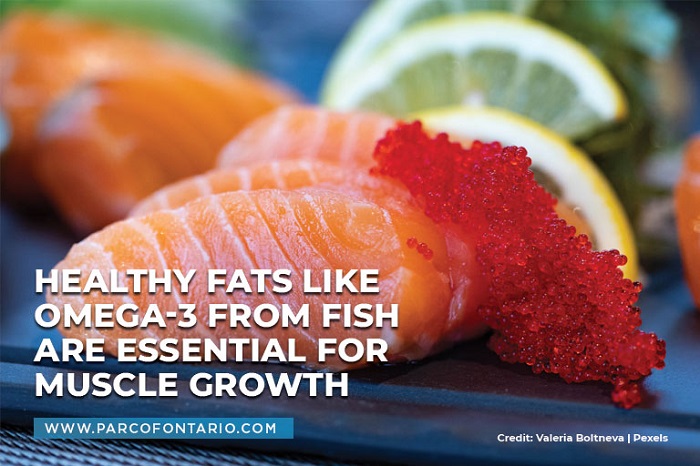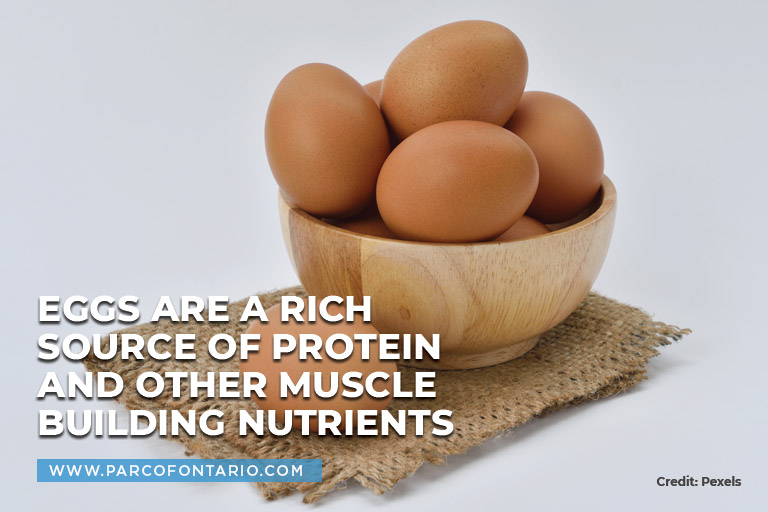Diet Tips to Build Muscles
Building your muscles is no easy feat. Athletes, bodybuilders, and fitness enthusiasts put great time and effort to achieve their body goals. Your muscles work as an “engine” to burn calories, even while you are at rest. Gaining muscle helps control weight, lower the chance of developing chronic diseases, and enhance the quality of life.

Beginners tend to expect significant gains only with exercise. But, you must understand how nutrition functions so that you may use it to improve your strength and fitness. It would be challenging for you to realize your goals if you are working out hard while disregarding the nourishment your body needs. It is important to remember that fitness can only be attained with the proper mix of exercise and diet.
How to Build Muscle With Diet
You don’t have to give up all of your favourite meals to get in shape. You only have to have the right amount of discipline. Here are a few diet tips to gain muscles:

Your daily calorie intake should contain 20% to 30% calories from fat. Unlike the sedentary general population, who are recommended to reduce their consumption of saturated fat, 5% to 10% of your fat calories should be saturated since higher-fat diets seem to sustain hormone levels better than low-fat diets. Remember, maintaining healthy testosterone levels is essential for enhancing strength and muscular growth while preventing fat storage.
Choose red meats like steak and ground beef for your saturated fats, as these also offer high-quality protein. Eat avocados, mixed nuts, olives, and peanut butter are high-protein snacks for muscle gain. Fatty fish, flaxseed oil, and walnuts are excellent sources of vital, omega-3 polyunsaturated fats.
- Eat More Protein
Daily protein intake should be at least 1 gram per pound of body weight. The amino acids needed to create the key components of muscle tissue are found in protein. Although the average person’s recommended daily protein intake is less than half a gram per pound of bodyweight, research reveals that athletes, especially those related to muscle building and strength, require almost twice that amount.
Lean animal proteins, such as those found in fish, poultry, meat, eggs, and dairy products, should make up the majority of your protein selections. These are the most comprehensive protein sources, meaning they give your body all of the necessary amino acids that it cannot produce on its own.
- Add Some Carbs
Daily carbohydrate intake should be between 2 and 3 grams per pound of body weight. Carbohydrates come in second place after proteins as the second-most important macronutrient for muscular building. Your muscles store carbohydrates as glycogen, which keeps them nourished and strong and fuels them throughout the exercise.
Although you need carbohydrates for energy, most individuals consume more than they require. Whenever possible, pair your meals with fruit and veggies. Rice, pasta, bread, potatoes, quinoa, and oats should ideally only be consumed after an exercise. Eat whole grains instead of white carbohydrates.

- Count the Calories
Eat 20 calories daily for every pound of body weight if you want to gain muscle. To acquire quality muscle, you must maintain a positive calorie balance —consuming more calories than you expend. Your body will switch to conservation mode and stop supporting the creation of new muscle if you burn more calories than you are taking in (a negative balance).
- Eat Breakfast
Eating breakfast gives you a quick boost of energy, keeping you satisfied until your next meal or snack. It also establishes a trend: if your day begins with a robust and nutritious breakfast, you’ll probably eat healthier throughout the day. Omelettes, smoothies, and cottage cheese are your best options if you’re wanting to gain muscle mass.
- Eat Every Three Hours
Eating to gain muscles needs discipline. It’s essential to eat the proper foods at the right times if you want to increase your muscle build. You won’t feel as hungry if you maintain regular eating habits. Your stomach will be smaller if you eat smaller meals more frequently rather than a few large ones. You’ll have fewer cravings, feel fuller more quickly, and see a reduction in your waistline. Long intervals of not eating might lead to overeating at your next meal or stocking up on unhealthy vending machine snacks.
- Eat Before Bedtime
You effectively fast for 7 to 9 hours while you sleep. When food isn’t available, the body turns to the protein in your muscles to get the amino acids it needs to power your brain. This is not a good thing if your goal is to gain muscle and lose fat. The solution is to consume the right meals just before going to bed. Your best bets are slow-digesting proteins and good fats. These nutrients lessen the body’s likelihood to utilise muscle because they aid in slowing digestion and offer a consistent supply of amino acids for fuel. Casein, the main protein in milk, is a healthy choice and may be found in protein shakes.
What Diet Is Needed to Build Muscle?
If you know the right foods to consume for your muscles, you can improve their health. Here are some superfoods for muscle gain you have to start adding to your diet:

It is well known that eggs are fantastic providers of high-quality protein. Any food that contains proteins has a higher biological value and benefits your body by boosting your resistance and vigour. The proteins in eggs are therefore crucial for the formation of muscles, as well. In addition to proteins, eggs also include all 9 necessary amino acids, choline, the appropriate amount of fat, and vitamin D. You can satisfy all of your needs with 1 or 2 eggs every day.
- Chicken Breasts
A basic food, chicken is a superb source of lean protein that’s essential for maintaining lean muscle, strong bones, and a healthy weight. A 100-gram meal of chicken breast has exactly the 30 grams of protein you need for healthy muscle building. For a fantastic dish of chicken salad, either boil it or combine it with veggies.
- Quinoa
If you’ve been battling to find the best vegetarian substitute for chicken or fish, your search is done. Quinoa contains all 9 of the necessary amino acids, making it a complete protein source. This gluten-free meal is also abundant in fibre, magnesium, and iron, and it is easy to digest. It is also a superior rice substitute, according to studies.
- Fish
Salmon and other types of fish are the best when it comes to growing muscle. Fish are a good source of protein, low in fat, and rich in Omega-3 fatty acids, all of which are crucial for promoting weight reduction and maintaining healthy bodily processes like your metabolism. Omega-3 fatty acids and monounsaturated fats, both of which are good fats, are also abundant in salmon.
Strong and healthy muscles are important for a better quality of life and for avoiding risks of pain and injuries. Regular exercise and a balanced diet are keys to getting in shape and ensuring your overall well-being.
If you wish to learn more about how to build muscle naturally, visit The Physiotherapy and Rehabilitation Centres (PARC) of Ontario for advice on nutrition in Whitby. Call us at (905) 430-2112 today to book an appointment.



